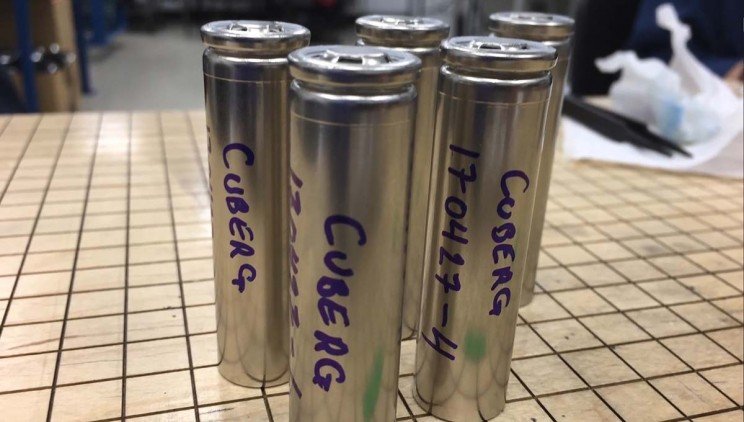Cuberg’s recent test between their battery and a conventional lithium-ion battery resulted in the Cuberg battery keeping a drone flying 70-percent longer. Given that the test is for two packs of equal weight, the result is an impressive one. Cuberg’s co-founder and CEO has prepared for this success since his undergraduate days as a SURF (Summer Undergraduate Research Fellowship) Fellow, putting his summer vacations to good use. He used the knowledge and experience he gained in three summer fellowships to help lead a dozen students “to design and develop innovative and efficient mechanical systems (including HVAC, hot water, insulation, appliances, and more) for the Solar Decathlon net-zero house competition.” The team won first place in the hot water contest and second place in the engineering contest in the Decathlon. Since then, he worked as an intern at Tesla Motors, using “physical, chemical, and electrochemical characterization techniques to study the degradation mechanisms of Li-ion batteries at the Cell Research Lab.” This led …
Batteries, Fuel Cells – or Something Else?
We’re coming to a parting of the ways in energy storage development for electric cars. Or we may be coming to a joining of technologies in new and previously unimagined ways. One side, led by Elon Musk and his Tesla Empire, promotes battery power and development. Yet, in Tesla’s home state of California, government and private investments in hydrogen vehicles is growing. Several Asian and European automakers are bringing out fuel cell powered vehicles in the face of low numbers of existing fueling stations. For all the promotion from either side, future “green” cars may become too expensive for private ownership, and various approaches to providing personal mobility may replace the traditional owner-driver model. Regardless of the outcomes or market shares, the technology will be applicable to personal aviation, although perhaps at a significant price. Battery-Powered Vehicles Lead – For Now According to EV World, “In the last year, global registrations of electric vehicles from the first three years of …
Less Expensive Batteries May Lead to More Homebuilt Electric Airplanes
It came as somewhat of a shock that high-quality lithium battery prices could drop low enough to encourage electric aircraft developers an opportunity to “scrounge” in the style of the original home-built airplane builders. Early aircraft “home-builders” often cannibalized war-surplus aircraft or wrecks of private planes for parts and materials that could be adapted into their own designs. Ground power units (GPUs), for instance, became an early supply point for engine cores that could be converted to aircraft use – possible on “Experimental” homebuilts, although frowned upon by the FAA for factory-builts. Your editor thought at one point that auto wrecking yards might provide a source of used batteries for experimental electric airplanes, but the thought of all the internal fracturing and potential for disaster with batteries of previously stable but now uncertain reliability cooled that enthusiasm. These batteries should not be used, but rather recycled. A discussion in Green Car Congress surprised with seemingly ultra-low, but verifiable prices on …
Swapping Rather Than Recharging
With Tesla now promising 90-second battery swaps, a “recharging” tactic first tried by Shai Agassi’s A Better Place, an Israeli company now in bankruptcy, the long recharging period for electric vehicles may be overcome. Car companies, though, are not the only entities looking for ways to get unplugged. Presented at the 20th Congress of the “Club des Villes et Territoires Cyclables” in Nice, the Alter Bike is a collaboration of three French companies: Cycleurope, a specialist in bicycles; Pragma Industries, a specialist in hydrogen; and Ventec, a specialist in battery management. They tout the advantages of this different approach to electrifying two-wheelers – an approach that seems to have applications even in electric flight. “No more charging time, no need to plug your bike into an electrical outlet! The Alter Bike uses hydrogen in a fuel cell: an existing technology in some cars, it can create electricity while emitting only H2O, in other words water.” “Refueling” looks like changing an oil filter …
Cool Bike, Cooler Batteries
A few years ago, Purdue University students Jim Danielson and Sean Kleinschmidt, helped launch the Purdue Electric Vehicles Club with physics major Tony “Danger” Coiro, who had created his own solar-powered motorcycle from a 1978 Suzuki he purchased for $50. Coiro drove around on his sun-mobile for less than one cent per mile. Just out of high school, Danielson and Kleinschmidt found another frugal ride, a 924 Porsche for a mere $500. The blown engine wasn’t a problem, since they replaced it with an electric forklift motor, controller and battery. The looks were great, although the poky top speed and lackadaisical acceleration strained against the image. Their initial success sent Kleinschmidt to a summer internship at Tesla where he worked on battery development and Danielson to Electro-Motive Diesel, where he helped create motor control electronics. besides founding the EV club, the trio oversaw construction of the 17 electric race karts that students built for the first-ever electric vehicle grand prix, …

